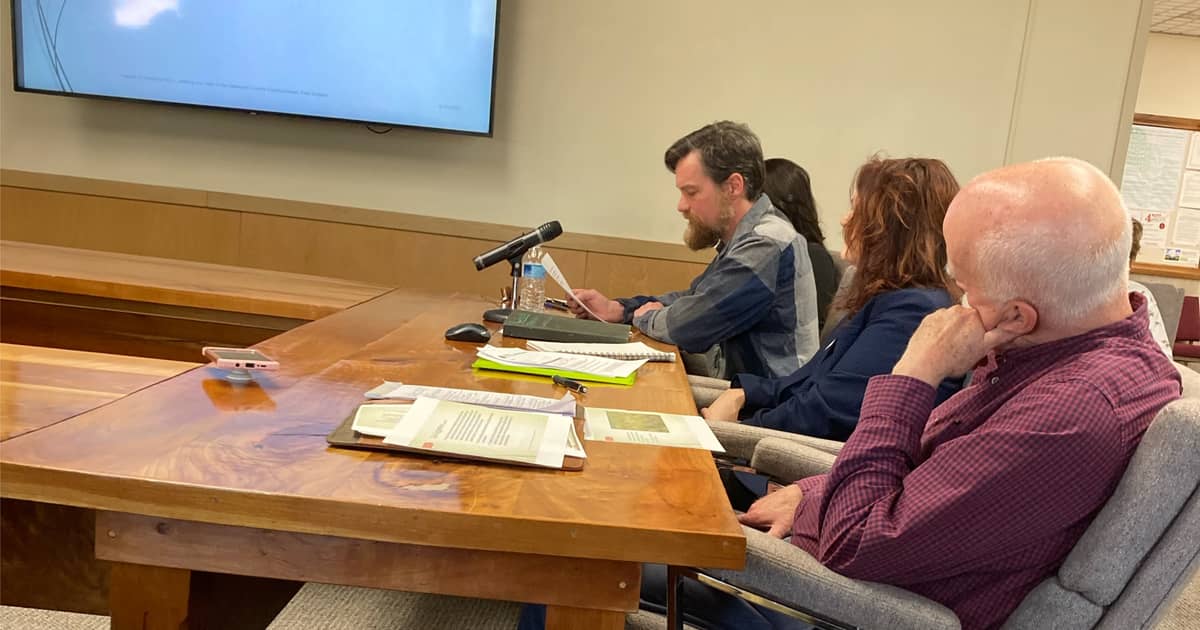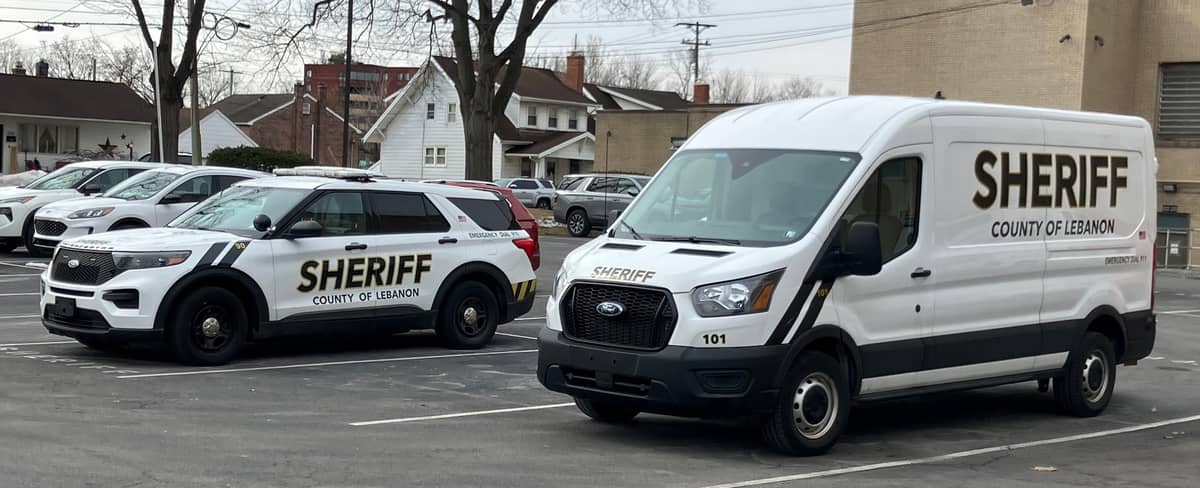Friends of Governor Dick members met Wednesday, April 19, with the county commissioners to address concerns they have about forestry management practices and other reforms they would like to see incorporated at the park.
Also in attendance at the packed meeting were concerned Mount Gretna residents as well as two of the six members of the park’s board of directors.

The friends group, described as an environmental organization, had requested a meeting with the county commissioners since they have ultimate jurisdiction over the park. The commissioners were added as part of the trustee board in 1998 when the park was deeded to the county, and became the sole trustee of the park in 2016.
Read More: Gov. Dick forest management plans again draw scrutiny of board by friends group
During the presentation, friends group spokesman Ryan Fretz read from a 10-page document that contained a list of their concerns and also outlined their arguments against how the park is currently managed.
“Per the deed establishing the park, the stewardship logging of Governor Dick is only permissible if the outcome is the improved health of the forest,” read Fretz. “We contend that this criteria is not being met, that negative impacts of these activities are detrimental to the health of the forest, and that the current logging operations are not justifiable.”
A slide projected on the screen showed several pictures of what Fretz said are examples of invasive species carpeting the park’s forest following a recent harvest.

“Two pictures of foreign invasives growing tall and replacing the native trees in the forest canopy and a picture of spotted lanternflies breeding on the thousands of the preferred host tree, the Tree of Heaven. All of this is a direct result of stewardship activities,” read Fretz.
Fretz then asked the commissioners to prove their argument wrong about the current forest stewardship plan. “Is the forest stewardship plan improving the health of the forest?”
After reading the next four bullet points containing their views about the health of the park’s ecosystem, Fretz asked the commissioners to reform the park’s board of directors. That slide contained 10 different subjects the group is asking the commissioners to address as part of their reform initiative.

“The membership of the park’s board does not represent the user groups of the park or the community at large,” Fretz said. “Without binding term limits, and the board’s ability to select its own membership, there’s been little turnover since the 1990s. The board has shown an unwillingness to listen to outside opinions that differ from their own.”
Fretz noted that around 20 years ago the original members of Friends of Governor Dick formed an environmental community at the park to “influence a more ecologically sound forest management.”
“Their efforts were to no avail, as they were disrespected, their advice dismissed, and, eventually, discouraged, the community was disbanded,” said Fretz.
Fretz also presented nine suggestions its organization has for the county commissioners with its top priority being the placement of a moratorium on timber harvesting until the park’s stewardship plan is re-evaluated.
Park board chairman Raymond Bender and David “Chip” Brightbill had told LebTown prior to the meeting that they would attend to gather facts and not make direct comments about the friends’ presentation. They said they would prefer to have a chance to review the presented material and craft a formal response for the commissioners.
They have in the past, however, commented on timber harvesting in a 2016 document the following statement:
“…relatively few forest tree species are present and most of those species produce seedlings that need large quantities of sunlight to survive. This growth trait in and of itself prevents the seedlings from becoming established and thriving under the canopy of their parent tree. In recent times, environmental imbalances have occurred with certain flora (e.g. invasive plants) and fauna (e.g. deer) which most certainly have stressed the environment beyond a point which can be overcome by the forest itself. We, as managers of all the forest resources at Governor Dick, must do our best to correct the imbalances which have occurred and introduce new tree species that can better compete under the shade of our majestic overstory trees.”
Fretz concluded his presentation by saying the group’s future intentions are to maintain a public awareness campaign by holding events, making outreach efforts via social media and other channels, and building community support for what his group believes are needed reforms.
He added that his group also hopes to “continue this dialogue between the Friends of Governor Dick and the County Commissioners in their role as trustees of the Clarence Schock Memorial Park at Governor Dick.”
Following the presentation, Mount Gretna Borough president Mike Sherman, who sat at the table with Fretz and two other members of the friends group, said he would like to present to the commissioners information he has that could be a win-win for the park.
“I can provide additional information, whenever it is convenient for you, about another source of revenue for the forest carbon project that’s a win-win situation because it improves the health of the forest and has a positive impact on climate change,” said Sherman.
Local resident Susan Wheeler, who said she is a naturalist by trade and who has worked at The Nature Conservancy, said forest fragmentation is, perhaps, the worst thing that can happen to the forest’s ecosystem. She asked the commissioners to consider an alternate way to address maintaining the health of Governor Dick Park.
At the start of the meeting, commissioner chairman Robert Phillips opened the floor for public comment, and several of the 25 attendees took the opportunity to address the commissioners.
Park board member Brightbill presented to the commissioners a book titled Forest Management and Planning that he said is an excellent resource and study guide for forestry management. According to its publisher-provided description, the book “provides a focused understanding of contemporary forest management issues through real life examples to engage students.”
Wheeler encouraged the county commissioners to get a second opinion from outside sources with no ties to the park, referring them to a Media-based organization that she said has provided their expertise to forestry stewardship at Governor Dick Park in the past.
“Years ago, we had gotten a forest stewardship plan from these people, and it’s not to compete with what was given to them (the park’s board of directors),” said Wheeler. “It is to give them an alternative view of how to preserve the forest without a lot of negative impact on the forest. I would encourage the board to look into that and possibly consider that as another alternative, just as a second opinion.”
After the meeting adjourned, Bender told LebTown that the park board will most likely create a committee to review the friends’ document and then address their points in a document to be presented to the commissioners.
Phillips told the audience that he hopes the park’s board of directors makes a presentation at a future public meeting of their response to the friends group’s document.
Questions about this story? Suggestions for a future LebTown article? Reach our newsroom using this contact form and we’ll do our best to get back to you.

Become a LebTown member.
Cancel anytime.
Monthly Subscription
🌟 Annual Subscription
- Still no paywall!
- Fewer ads
- Exclusive events and emails
- All monthly benefits
- Most popular option
- Make a bigger impact
Already a member? Log in here to hide these messages
While other local news outlets are shrinking, LebTown is growing. Help us continue expanding our coverage of Lebanon County with a monthly or annual membership, or support our work with a one-time contribution. Every dollar goes directly toward local reporting. Cancel anytime.

























